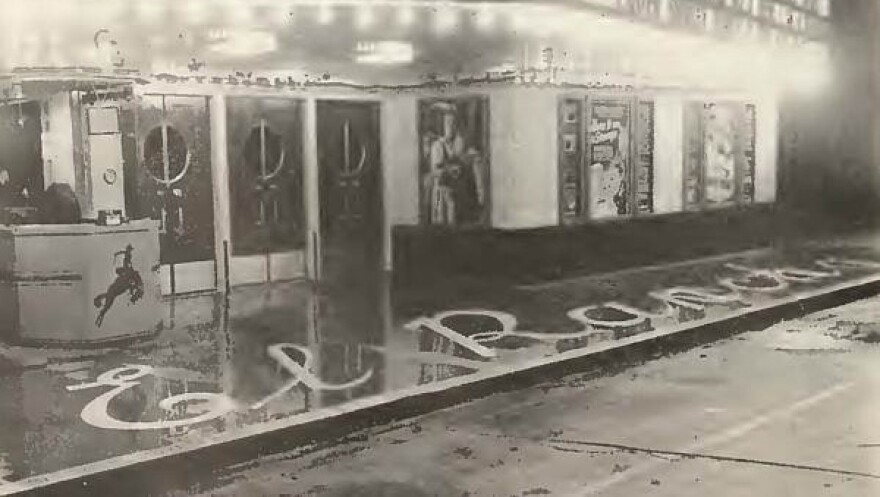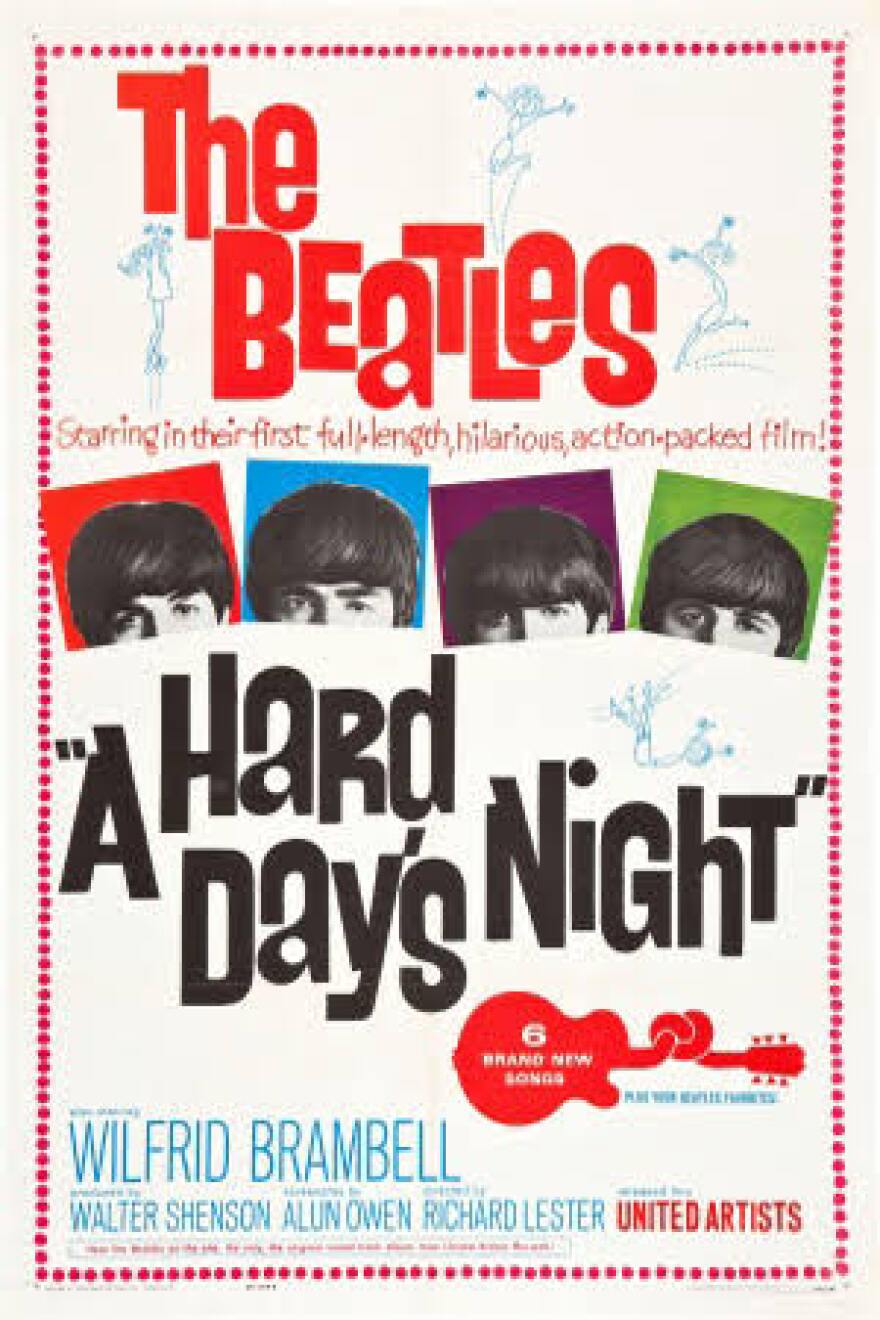Ed. note: TPR's James Baker has a million stories to tell about being a performing musician. In honor of our final Cinema Tuesdays show of the summer, this time he shares a memory of being a fan.
In the early 1960s I became a teenager. Being the first born child in my family placed me ahead of 2 brothers and 2 sisters in the all-important pecking order. In truth, my youngest sister wasn't quite “in the oven” yet when I officially turned 13. She came a year later, the same year the movie “The Man Who Shot Liberty Valance” came out. Although I don't pretend to recall an exact timeline for events a half century ago, I expect that our family, including my father, my pregnant mother, and their four children walked the four blocks to one of the several movie houses on, or near, the main plaza in Victoria, Texas and saw the John Wayne-Jimmy Stewart classic in its first run.

In those days there were, in fact, four movie theaters in Victoria, Texas. One, the Victoria, right next to the post office, played mostly Spanish language films, later third run movies. Just a few blocks away was another Spanish language theater, called the Venus. The remaining two, the Uptown, and El Rancho, sat on opposite sides of DeLeon Plaza. These are the two I remember clearly.
I don't know if it's still a prevalent social custom, but in those days, the Eisenhower, then the Kennedy/Johnson eras, it was not uncommon for entire families to attend movies together. The Baker Family took in a pretty steady diet of westerns, especially John Wayne, and the comedy of Jerry Lewis and Dean Martin. My mother was still young enough to become weak-kneed at a Pat Boone movie. I still remember seeing “Journey to the Center of the Earth,” starring Pat Boone, when it released in 1959. Interestingly, we had taken a family vacation that summer to Carlsbad Caverns, finding on arrival that they were shooting a movie deep down in the caverns. That movie turned out to be the 1959 make of the Jules Verne classic.
Something happened when I crossed over into my teen years. I certainly wasn't the first, nor the last teenager to rebel. The idea of going to a movie with my parents was no longer my idea of a great time. Even when we went to the drive-in, I was the first out of the car once we were parked, distancing myself from my parents to go watch from the benches near the concession stand. I grudgingly allowed my two brothers to tag along, but I bullied them every step of the way. I was growing up, beginning the search for my own muse. Whatever my parents stood for, I wanted something else.
By 1963, I was in full rebellion, though much of it was internalized. When I would look around my Junior High classrooms, I saw others who were external in their rebellion. Some of the boys were already beginning to smoke cigarettes. Others were drinking, and smoking non-tobacco materials. The most rebellious grew their hair long (over their ears) and got called to the principal's office for stern lectures. I buried my head in books and music, excelling as a student.
Then came that fateful day, November 22, 1963. The announcement came over the PA system. I can't remember exactly what was said, but I can still taste the moment that JFK died. They dismissed classes, sending us all home. The country went into deep mourning as we tried to fathom the new world we had been involuntarily thrust into. Two days later, we watched in horror as Jack Ruby gunned down Lee Harvey Oswald in a cramped hallway in the basement of Dallas police headquarters. This cast a pall over the entire country which lasted for months, if not years.
Perhaps this drew many American families closer together. The feeling was that family might be all we could count on. As a country, we hankered for something to lift our spirits. That something came Sunday night, February 9, 1964 with the now famous words of Ed Sullivan: “Ladies and gentlemen…the Beatles!” A buzz had been in the air for several months, prompting our family to sit together in front of our black and white television, anxious for a first look at the mop-headed quartet. We were not disappointed. Their fresh faces and simple but engaging music swept us all off our feet. In a sense, this was the antidote to the deep funk of a nation. There were still plenty of hurdles ahead as Vietnam and the profound social reforms of the day dominated the daily newscasts. But for a moment, on that Sunday evening, the country began its recovery from the dark days of presidential assassination.
The summer of 1964, I prepared for the transition to high school. (In those days, Victoria public schools designated elementary as grades 1-6, junior high as 7-9, and high school as 10-12.) Hormones drove my rebellion, aimed now at everyone family. My father's mother, Granny, lived with us as she languished in a wheel chair, partially paralyzed by a stroke. I fought with her, I fought with my parents, and resented my younger siblings. I escaped into the world of historian Bruce Catton's “Civil War,” in three volumes. My interest in music was mostly classical, part true interest and part rebellion against everyone else's musical preferences.

I listened to The Beatles because you couldn't live at that time and not. Their music was everywhere. In the fall of 1964 that included the movies. “A Hard Day's Night” rode the popularity of McCartney-Lennon-Harrison-Starr to become an almost immediate hit in movie houses around the world. When it finally arrived at the El Rancho, we revived our tradition of the family movie. Setting aside our differences, the nagging, and the growing pangs, we set out for the box office which was fronted by Forrest Street. Stopping at the concessions in the lobby, we stocked up on Milk Duds, popcorn and syrupy Cokes, then found a block of seats which could accommodate the entire family. We were seven by then, though my youngest sister, Brenda, was still a lap baby.
I recall being swept away by the fast, irreverent pace of “A Hard Day's Night,” by the freshness of the music, and by the atmosphere of the movie theater. This infected us all. It was a great 87 minutes of entertainment and the last time we ever went to the movies as a family. This is not to say we splintered. There were still camping vacations to Big Bend National Park and family roots vacations to see relatives in East Texas. Nevertheless, when we walked away from “A Hard Day's Night,” something changed which could never be reversed. We grew apart, became independent, the adults grew old, the young became adults. Families do this. It's not for us to mourn. Yet half a century later, if it were possible to hit a rewind button, this would be one moment I would try to regain: The Beatles, on the big screen of the El Rancho, with the entire family sitting in a row. That would be something!




